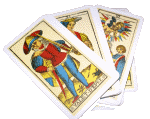
Bohemian Gothic Tarot
PAGE OF WANDS
Lighter or more conventional meanings
Energy and enthusiasm * New projects bring excitement * Innovations, experiments, a willingness to try new approaches * Messages, letters, news.
Darker, shadow or more hidden meanings
Hidden passions, especially in a young person * Energies put into negative activities * Nature in a form that is uncontrolled and threatening * Over-enthusiasm or an obsession with something.Like all the Pages, the Page of Wands indicates someone, usually a young person, embarking on novel experiences or a new course of learning or study. Because this is one of the fiery Wands Courts, this card particularly concerns action, movement, passion and energy and indicates someone launching themselves into an activity that is fresh and exciting. In the Bohemian Gothic card the young girl at the front of the picture looks both static and, indeed, insubstantial, and it's the boy in the background who appears much more representative of the card's energy, playing his violin with an enthusiasm that's obvious even at a distance. The whole scene is completely dominated by the huge gnarled tree that seems to take up the entire space. Are the children, standing in the mist that rises up from the ground, alive? Perhaps not; they may be phantoms attached, in some way, to the energy of the tree.
In tarot, Wands are often depicted as living branches and either budding or covered in fully developed leaves and blossom. It's a way of showing the energy of the Wands suit as being not only about the drama of fire, flame and blazing passion, but also about the quieter, but equally powerful energies of organic growth and blossoming life. In our card the tree symbolises this aspect of Wands, as does the elaborate, leaf-wreathed wand that the girl holds in her hand. But the boy's violin string is also a type of wand. We wonder what kind of weird, passionate music he's playing. The entire scene is eerie and disquieting, the children's clothing is very pale and monochrome and the only bright spot is the blood-red book that the girl carries.
This card asks us to think about both the positive and negative features of energy, particularly in someone who is enthusiastic to the point; maybe, of obsession. This type of person might well be a fiery young rock musician who experiments with almost anything that looks exciting. He might be a young sports-person who trains relentlessly, and will do anything to win, even at the expense of his own future health. Someone like this can burn out very young, consumed by their constant need for adventure and challenge. If they don't learn to control this hectic search for excitement, risk and endless "highs" they may quickly be reduced to a pale shadow, a mere ghost of their former young self.
Some further ways to consider this card
Who are this boy and girl? Is the wood real or is it more of a dream landscape?Whilst the girl stood still, half smiling, with her hands clasped over her heart, the boy, a thin shape, with black hair and ragged clothing, raised his arms in the air with an appearance of menace and of unappeasable hunger and longing. The moon shone upon his almost transparent hands, and Stephen saw that the nails were fearfully long and that the light shone through them.
- M.R. James, "Lost Hearts", Ghost Stories of an Antiquary.
He was, moreover, approaching the very place where many of the scenes of the ghost stories had been laid. In the centre of the road stood an enormous tulip-tree, which towered like a giant above all the other trees of the neighbourhood, and formed a kind of landmark. Its limbs were gnarled and fantastic, large enough to form trunks for ordinary trees, twisting down almost to the earth, and rising again into the air. It was connected with the tragical story of the unfortunate André, who had been taken prisoner hard by; and was universally known by the name of Major André's tree. The common people regarded it with a mixture of respect and superstition, partly out of sympathy for the fate of its ill-starred namesake, and partly from the tales of strange sights, and doleful lamentations, told concerning it.
- Washington Irving, "The Legend of Sleepy Hollow", The Sketch Book of Geoffrey Crayon, Gent.
As she sat after supper at a little window, that opened upon the country, observing an effect of the moon-light on the broken surface of the mountains, and remembering that on such a night as this she once had sat with her father and Valancourt, resting upon a cliff of the Pyrenees, she heard from below the long-drawn notes of a violin, of such tone and delicacy of expression, as harmonized exactly with the tender emotions she was indulging, and both charmed and surprised her. Cavigni, who approached the window, smiled at her surprise. `This is nothing extraordinary,' said he, `you will hear the same, perhaps, at every inn on our way. It is one of our landlord's family who plays, I doubt not,' Emily, as she listened, thought he could be scarcely less than a professor of music whom she heard; and the sweet and plaintive strains soon lulled her into a reverie.
- Ann Radcliffe, The Mysteries of Udolpho.









